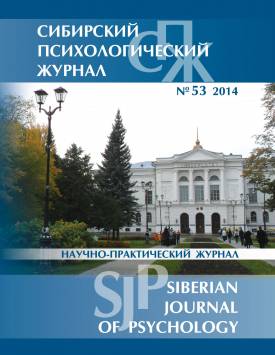Meaning conditioning of creative act: system-anthropological context
The formation of the creative act, its origin that characterizes the moment of transformation of trivial (algorithmic, everyday, stereotypical, etc.) activity into creative activity, is considered to be one of the complex and poorly studied problems of modern science. The psychological mechanism that triggers creative activity taking place "here and now" usually escapes from researchers. In this case the fact of finding a new way of solving the problem acts only as a specific indicator of the creative act, for example, in studies of mathematical creativity it can be a marker of the level of creative possibilities of the person. The research subject focuses on psychological mechanisms and the conditions of its occuranace. Transspektive analysis shows that the problem of identifying psychological conditions and mechanisms of creative acts can not get a complete solution in the framework of classical and non-classical paradigms. The matter is that creative act occurs as one form of free realization of the possibilities of the person being the phenomenon that has system determination. Understanding of this kind of determination was developed in system anthropological psychology (SAP) in which this study was performed. This paper describes the method focused on the synchronous recording of emotional, verbal and substantial characteristics of the activities at the stage of its transformation into creative activity. It is shown that system anthropological approach allows to integrate substantive, procedural and motivational aspects of the study and uses them in explanation of the mechanism of the creative act. We were able to detect a special role in determining the operational meaning of the creative act. Operational meanings arise as an effect of self-organization that is inherent for a man as an open self-developing system. Emotions are not only the mechanisms of the reflection of the meanings but the form in which the meanings exist. From the position of SAP some early identified phenomenon can be explained in a new way. In particular, "emotional positioning systems" can be understood as a special integrative (system-wide) formations that ensure the unity of consciousness, situation and human activity. They define a meaningful part of the activities during the periods of its transformation into creative activity, providing a link between conscious and unconscious, will-controlled and unwilled, judgemental and executive mechanisms. It helps to overcome the gap in the understanding of the psychological nature of the creative act, occurred as a result from the opposition between personal and activity approaches to the phenomenon of creative act.
Keywords
emotional-positioning complex, self-determination, self-development, creative activity, system anthropological psychology, creative act, саморазвитие, эмоционально-установочный комплекс, самоорганизация, системная антропологическая психология, креативная деятельность, креативный актAuthors
| Name | Organization | |
| Klochko V.E. | Tomsk State University | klo@nextmail.ru |
References

Meaning conditioning of creative act: system-anthropological context | Sibirskiy Psikhologicheskiy Zhurnal – Siberian Journal of Psychology. 2014. № 53.
